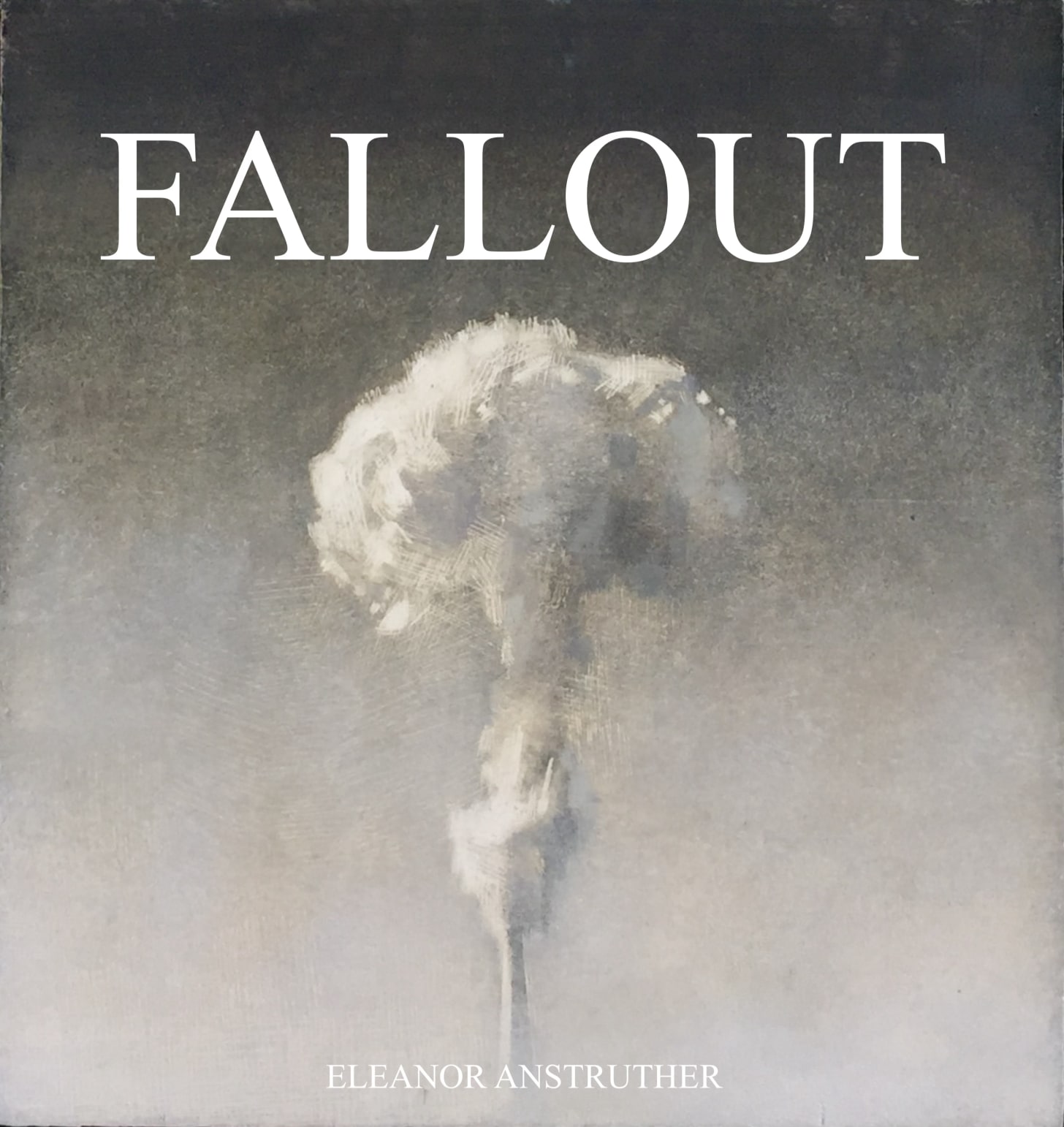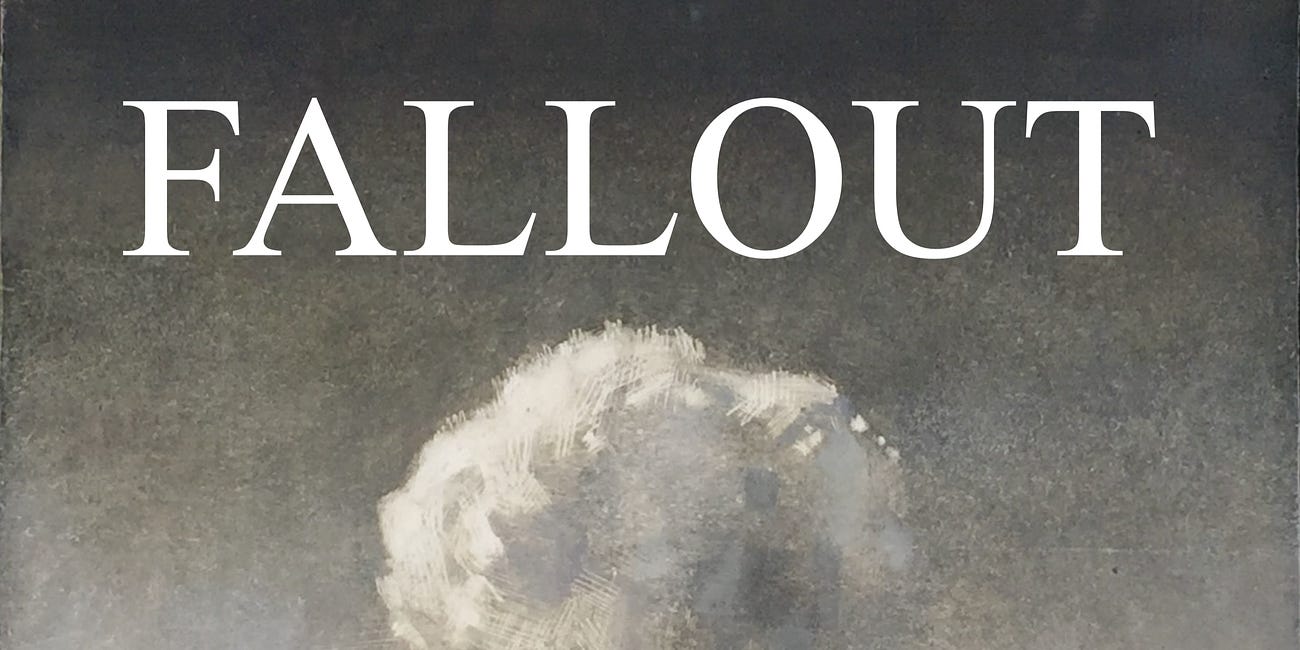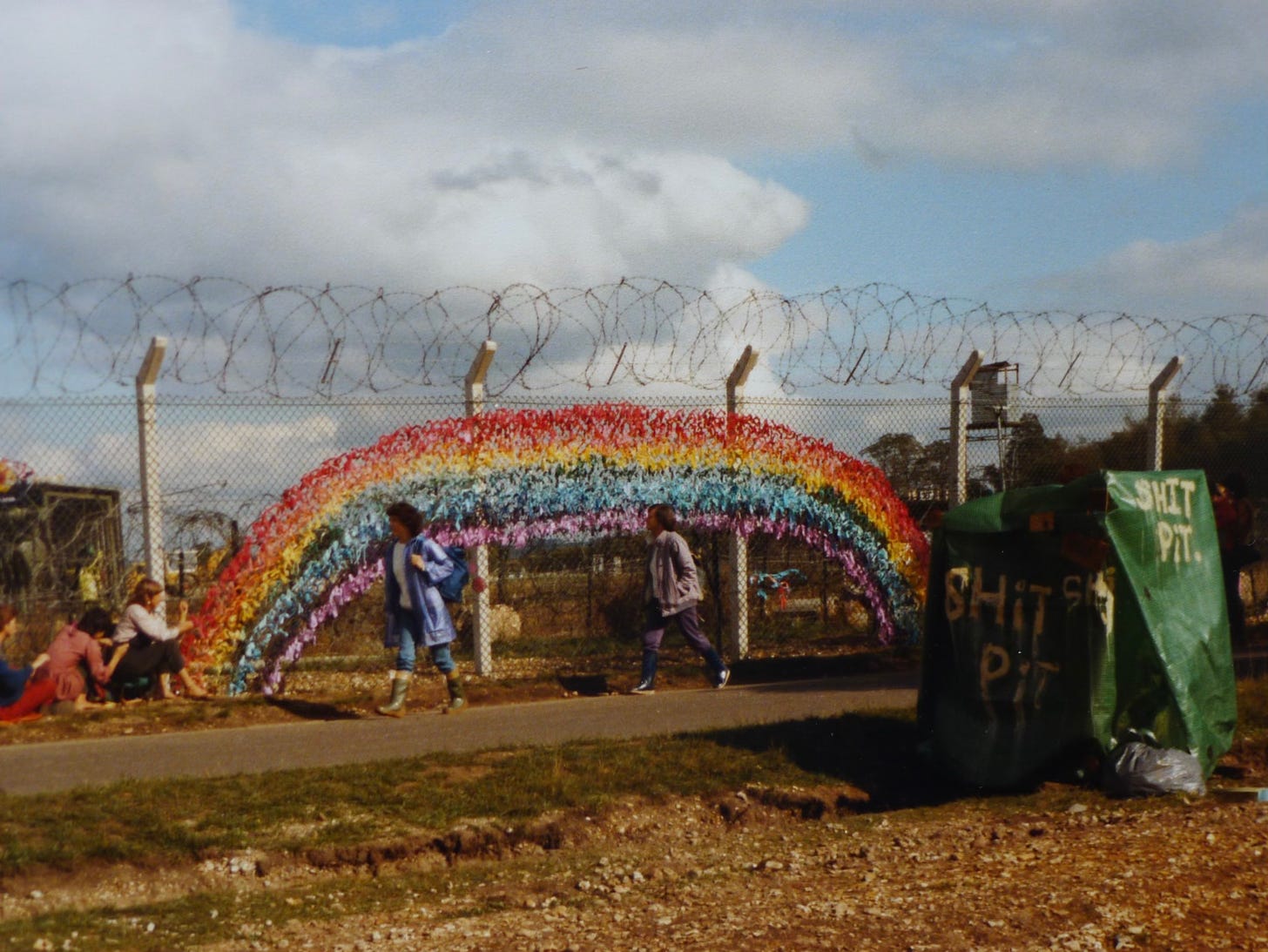They gathered her up, Bridget’s mum, and brought her to the campfire, a seat among them, a cup of tea that Janet looked at and said, I won’t thanks. She sat there like a mouse among beasts as if they’d eat her, shying from their kindness, her knees together, her eyes on her daughter. And then she left and Bridget, Dawn and Cerise got in Maureen’s bashed up red car and drove round to Blue Gate. Dawn said it was better there. Fewer meetings than at Yellow, fewer middle class women acting like the only Greenham was their Greenham, all headscarves and polite ideological debates, trying to link themselves to the miner’s wives, and telling Dawn they liked her hair.
Bridget had heard of racism, but only just. Her dad used a word for the Indian man at the corner shop that her mum said wasn’t nice.
Dawn said, “If I’d been fighting it from the get-go I’d have never come to Greenham.” She’d grown up in a village near Sheffield, adopted by a white family, shielded from overt racism, she hadn’t known what it was till she went to London. “In case you haven’t noticed, nuclear annihilation is the first problem they’ve come up against.”
Bridget hadn’t noticed. She’d only noticed Dawn.
So they got in Maureen’s car and drove down the road to Blue gate where the women didn’t just talk, they did stuff.
“Not so up itself,” was how Dawn put it.
And it was nearer the Rokeby Arms. At Blue gate Bridget learnt to dig shit pits.
“What, you shit in a hole?” Bridget asked when Dawn handed her a shovel.
“Where else are you going to do it?” replied Dawn and Bridget thought about her dad punching out the seat of one of her mum’s kitchen chairs and why did the end of the world always end up in the toilet? They walked into the woods, shovels over their shoulders, Bridget’s trainers caked in mud.
“You’ll have to get boots.” Dawn was doing a PHD at Kings College. It was because of her that Yellow gate had a standpipe. She’d reminded Berkshire council that all addresses had a right to services, and since the arrests and orders to appear before court, Greenham Women’s Peace Camp was a registered address.
Cerise picked the spot. Dawn put down her shovel. “White women are as fucked by the patriarchy as Black women but Black women know it and white women don’t.”
“They’re duped.” Cerise rolled one of her liquorice cigarettes.
“By what?” said Bridget.
Dawn borrowed Cerise’s tobacco and did the same. “White women are lulled into a sense of security by the tide that’s with them. Till now they’ve gone along with the diktat of how government likes them to be. They haven’t rocked the boat just by being themselves. If you’re a white, middle class, heterosexual, well-behaved, married mother, you won’t have been challenged for being who you are, and the life you lead will be the life you expect to lead. You’ll be playing by the rules without knowing there are any. You’ll be a favourite type without knowing there is one. When you’re not any of those things by birth or choice or circumstance you find out pretty quick that there are rules and there is a favourite type and if you’re not it, you’re breaking them. Middle class white women have been white and pleasant their whole lives and suddenly something’s come along which has made them not pleasant and they’ve discovered what Black women have known all along, that the government doesn’t give a fuck about them and will march all over their views and their rights and fuck them for even trying to stop it.”
“I didn’t know any of that,” said Bridget.
“That’s because you’re white and middle class and you’ve spent a decade in an education system designed to keep you stupid.”
“My mum’s a dinner lady.”
“You live in a house, don’t you?”
Bridget had to concede that she did.
“And the school you go to, the education system that’s fed you along with your mum’s chips was built by the British Empire. It will only ever teach what privileged white men want you to learn.”
“HIStory,” said Bridget, remembering.
“They’ll never teach you what you need to know.”
“Smash the patriarchy,” said Bridget.
“It’s insipid, it’s down to the bone. These white women think they know who they are, but they don’t, not till they come here, not till they break the law. I don’t blame them.”
“Who blames them?” She thought of her mother in her tabard, always at the cooker.
“Blaming the victim is a tenet of the British Empire. We’re all victims of empire in the end, victims of the patriarchy, even your dad.”
“But he’s a man.”
“He’s being told what a man is and ordered to be it, just like you’re told what a woman is.”
“I know what a woman is.”
“Do you, though? Ever wanted to be something, or dress in something or do something and been told it’s not for girls?”
Bridget thought of when she’d asked her mum to swap a pink nightie Granny Reynolds had given her for Christmas for the blue pyjamas Paul had got.
“The patriarchy defines you. It tells you what a girl is and what a boy is and that there’s such a thing as good and bad. It tells you that gender is fixed and there are only two kinds, and the same with sexuality only there’s only one kind of that and if you’re none of those things you’re wrong. But here’s the thing, Bridget, you can be anything you want and whatever you choose is the definition of you. You are whatever you say you are, and every time a person is who they really are, they widen the definition of what it is to be human, whether you’re fat or thin or loud or quiet, or gay or straight or male or female or been born a girl but would prefer to be a boy or be none of those things at all, who you are, the definition of you is your right to claim. You get to tell us who you are. Not your mum or your dad or school or the media or government or any member of society. You are writing you, Bridget. You define you.”
“How can you be none of those things?”
“Gender and sex are social constructs, Bridget. We invented them. Which is fine until we invented hierarchy, blacklists, and the idea of right and wrong. You are who you say you are, and no fucker gets to tell you different. Having the right to define yourself and the liberty to be it without fear of violence is every person’s human right. It’s the only thing that matters.”
“And smashing the government,” said Cerise, chucking the stub of her smoke on the ground and taking up her shovel.
Bridget wished she had gloves. She started digging. “My mum said I was a tomboy and I should grow out of it since my thingy started.”
“Your period,” said Cerise.
“There’s no shame in it,” said Dawn.
But there was. All of it. She thought of her mum persuading her into a swimming costume down the local pools and how the string of her Tampax had poked out and blood had leaked and her mum had hurried her back to the changing rooms.
She said, “Has my mum been duped?”
The trench was big enough to stand in. She passed a bucket up to Dawn.
“Every white woman on your street has been duped into thinking they know who they are when all they’re doing is fitting into the status quo.”
“My dad says Status Quo should get their hair cut.”
Dawn laughed and Cerise looked non-plussed.
They were, all three, covered in dirt. Their clothes stank of woodsmoke and rain. Out of her bag Cerise took a can of paint and sprayed, Shit pit on a piece of canvas.
Back at camp, Bridget shaved the sides of her hair like Dawn, Cerise pierced her ear, and they all went down the Rokeby Arms with Maureen and got drunk. When Bridget did her IRA voice, Maureen didn’t find it funny. “Those boys are only doing what the fucking English have been doing to them for eight hundred years.”
“Sorry,” said Bridget.
“You’ll learn,” said Maureen.
That night, over her first pint ever, Bridget learnt from Maureen about state sponsored genocide, and from Dawn about state sponsored racism, while Cerise introduced the word fascism into her vocabulary. And they all taught her how to spell patriarchy when she sprayed fuck the patriarky onto Cerise’s bender.







“Why did the end of the world always end up in the toilet”. Beautiful juxtaposition of epic annihilistic drama and the bog. Made me laugh a lot.
"Patriarky"—a lovely touch, with Bridget striving to keep up with her new friends and not quite managing it because the word (or concept) was simply not in the vocabulary of the culture was brought up in.